Black Sabbath Meaning In The Bible: Rest and Reverence
The term ‘Black Sabbath‘ does not originate from biblical texts. Instead, it has evolved through historical and cultural interpretations.
Biblically, the Sabbath, established in the Old Covenant, is a sacred day of rest and spiritual rejuvenation as commanded by God, reflecting divine rest after creation (Genesis 2:2-3, Exodus 20:8-11). In the New Covenant, Jesus emphasizes mercy and human need over rigid Sabbath observance (Mark 2:27-28).
Over time, ‘Black Sabbath’ gained connotations in medieval Europe associated with witchcraft and dark rituals, diverging from its biblical roots. Understanding these layers reveals richer insights into religious and cultural transformations.

Black Sabbath Meaning in the Bible: Origins, Misconceptions & True Sabbath
| Term | Biblical Reference | Meaning/Context | Spiritual Insight |
|---|---|---|---|
| Black Sabbath | — | Not found in the Bible; appears in occult or music culture contexts (sabbathtruth.com, sabbathfacts.org) | Represents modern misuse or dark connotations, not scriptural teachings |
| Genuine Sabbath | Genesis 2:2–3 | God rested on the seventh day, blessing and sanctifying it | Symbolizes divine rest, creation completion, and covenant relationship with God |
| Sabbath (Exodus 20) | Exodus 20:8–11 | One of the Ten Commandments mandating weekly rest | Signifies obedience, remembrance of God’s deliverance, and spiritual renewal |
| Black Sabbath (Judaism) | — | Term used for ritual gatherings (e.g., witches’ sabbath) or Shabbat Chazon, a day of mourning | Reflects cultural overlay; not part of biblical text, but shows divergent meanings |
Biblical Sabbath Overvie

The Biblical Sabbath, deeply rooted in Judeo-Christian tradition, is a day set apart for rest and spiritual reflection as commanded in the Fourth Commandment.
This observance is not merely a cessation of labor but embodies a profound theological significance, symbolizing God’s rest after creation and serving as a covenantal sign between God and His people.
The Sabbath provides a rhythmic pause in the weekly cycle, fostering a reconnection with the divine and reinforcing communal and familial bonds. Its observance has evolved over centuries, reflecting cultural and theological shifts.
Yet, its core principle remains steadfast: a divinely mandated reprieve from the mundane, inviting an intentional focus on spiritual rejuvenation and alignment with divine will, thereby reinforcing the sacredness of time.
Sabbath in Old Testament
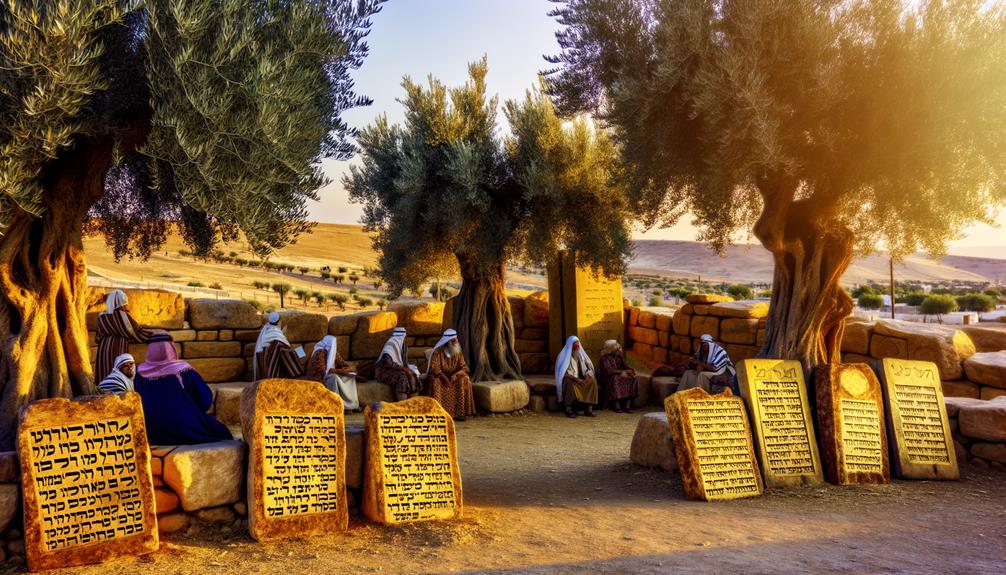
The Old Scriptures establish the Sabbath as a cornerstone of spiritual and communal life, emphasizing its significance through divine commandments. It is enshrined in the Decalogue, reflecting not only a day of rest but also a covenantal sign between God and Israel.
This duality of purpose—rest and remembrance—reinforces the Sabbath’s profound theological and social implications within the Hebrew tradition.
Sabbath Day Significance
In the Old Scripture, the Sabbath day is imbued with profound theological and cultural significance, serving as a covenantal sign between God and His people. It was instituted as a day of rest and spiritual rejuvenation, reflecting God’s rest after creation (Genesis 2:2-3).
The Sabbath underscores a divinely ordained rhythm of work and rest, emphasizing humanity’s dependence on divine provision. It also functions as a perpetual reminder of Israel’s deliverance from Egyptian bondage (Deuteronomy 5:15), symbolizing liberation and divine favor.
Commandments and Sabbath
Embedded within the Decalogue, the commandment to observe the Sabbath encapsulates both a theological mandate and a socio-religious ethos central to the covenantal relationship between God and Israel.
This observance, articulated in Exodus 20:8-11 and Deuteronomy 5:12-15, underscores a dual purpose: a divine rhythm of work and rest reflective of God’s creation narrative and an ethical framework promoting communal equity.
The Sabbath commandment emphasizes rest for all societal members, including servants and foreigners, embodying an egalitarian principle.
Additionally, the Sabbath serves as a perpetual sign of sanctification and divine sovereignty, aligning Israel’s temporal rhythms with sacred time.
Consequently, the Sabbath is both a symbol of divine rest and an instrument of social justice.
Sabbath in New Testament

In the New Covenant, the observance of the Sabbath becomes a focal point of theological debate, particularly in the context of Jesus’ actions and teachings.
Jesus frequently confronted prevailing Sabbath interpretations, emphasizing the primacy of human need and divine intention over rigid legalism.
Moreover, Apostolic teachings reflect a nuanced perspective on Sabbath observance, often reinterpreting its significance in the light of Christ’s resurrection and the nascent Christian community’s practices.
Sabbath Observance Debate
The New Scripture presents a nuanced perspective on Sabbath observance, reflecting both continuity and transformation from Old Scripture practices.
Central to this debate is the interpretive shift seen within the New Covenant, where the Sabbath’s role is reassessed in light of Christ’s teachings and the nascent Christian community’s needs.
While some texts emphasize the Sabbath’s enduring sanctity, others suggest a reconfiguration, prioritizing spiritual rest and worship over strict legalistic adherence.
This duality has sparked extensive theological discourse, raising questions about the Sabbath’s place in a faith evolving from Jewish traditions to a broader, more inclusive understanding.
Consequently, Sabbath observance remains a complex and contested issue, intricately woven into the fabric of early Christian identity and praxis.
Jesus and Sabbath
Central to the New Scriptures’ exploration of Sabbath observance is Jesus’ reinterpretation of its significance, which often positioned him at odds with prevailing Jewish customs and authorities.
Jesus emphasized the Sabbath as a day for doing good and meeting human needs, rather than strict legalistic observance. In Mark 2:27, he famously declared, ‘The Sabbath was made for man, not man for the Sabbath,’ highlighting the principle of mercy over ritualistic compliance.
His healing on the Sabbath, such as in Luke 13:10-17, underscored his view of the day as an opportunity for liberation and restoration. This approach not only challenged established norms but also redefined the Sabbath’s purpose within the broader context of his ministry and message.
Apostolic Sabbath Teachings
Apostolic teachings on the Sabbath in the New Scriptures reveal a nuanced understanding of its observance, reflecting both continuity and transformation in early Christian thought. The apostles adopted a flexible interpretation, emphasizing the spirit rather than the letter of the law.
This approach is evident in various passages where the Sabbath observance is discussed in relation to Jesus’ teachings and the new covenant.
| Aspect | Apostolic Interpretation |
|---|---|
| Sabbath Rest | Spiritual rest in Christ (Hebrews 4:9-10) |
| Day of Worship | Shift towards the first day of the week (Acts 20:7, 1 Corinthians 16:2) |
| Legalism vs. Grace | Emphasis on grace over legalistic observance (Colossians 2:16-17) |
| Community Gatherings | Encouragement of communal worship and fellowship (Hebrews 10:25) |
Thus, early Christian views on the Sabbath reflect a balance of tradition and innovation.
Historical Context of Sabbath
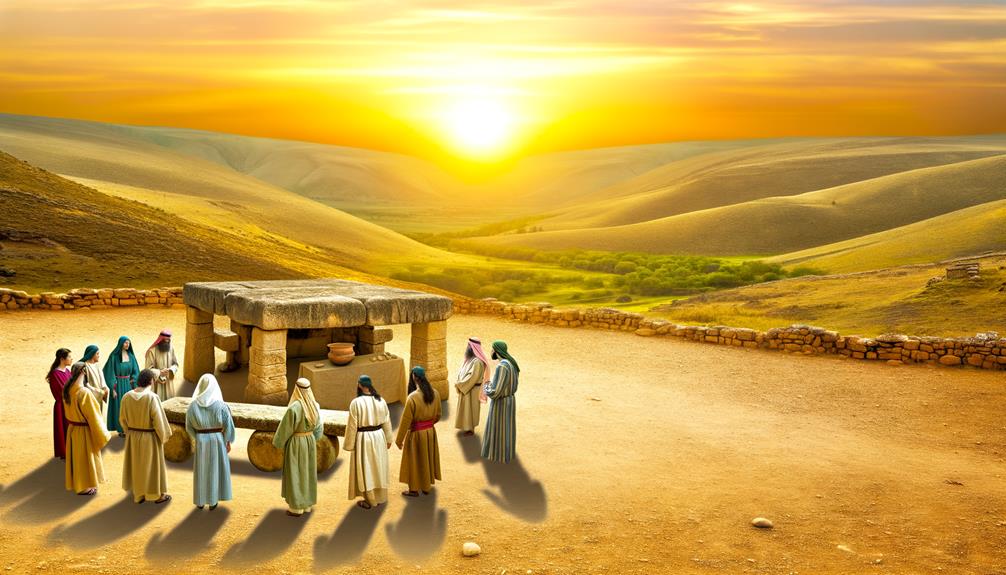
Rooted in ancient Judaic tradition, the observance of the Sabbath finds its origins in the biblical narrative of creation, where it is described as a divinely instituted day of rest.
Within the Book of Genesis, the seventh day is sanctified by God following six days of creation, establishing a precedent for human rest and worship (Genesis 2:2-3). This sanctification underscores its significance, later codified in Mosaic Law as one of the Ten Commandments (Exodus 20:8-11).
The Sabbath served as a covenantal sign between God and Israel, emphasizing both divine sovereignty and human dependency on divine providence.
Historically, this practice distinguished the Israelites from surrounding nations, reinforcing their unique identity and commitment to Yahweh’s commandments.
Sabbath Practices and Traditions

Sabbath practices and traditions encompass a rich tapestry of observances, rituals, and cultural variations that underscore its religious significance.
Central to these traditions is the Sabbath Day observance, which includes specific rituals designed to honor and sanctify the day.
Furthermore, examining the cultural adaptations of Sabbath practices reveals how different communities have preserved and reinterpreted these ancient customs throughout history.
Sabbath Day Observance
In examining Sabbath day observance, it is essential to explore the diverse practices and traditions that have evolved within different religious communities over centuries. The Sabbath, a day of rest and spiritual reflection, manifests uniquely across various faiths, reflecting cultural and doctrinal nuances.
- Jewish observance: Emphasizes cessation of work, prayer, and communal meals, beginning at sundown Friday.
- Christian practices: Often include Sunday worship services, rest, and family activities, rooted in the resurrection of Jesus.
- Seventh-Day Adventists: Observe Saturday as a day of rest, worship, and community service, emphasizing biblical adherence.
- Islamic traditions: Although Friday is a significant day for communal prayers (Jumu’ah), it does not share the same rest-day status as the Sabbath in Judaism and Christianity.
These practices highlight the Sabbath’s varied significance within global religious contexts.
Traditional Rituals Explained
Frequently observed through a tapestry of rituals and customs, Sabbath practices across different religious traditions offer profound insights into the spiritual and communal values upheld by their adherents.
In Judaism, the Sabbath, or Shabbat, commences at sunset on Friday and concludes at nightfall on Saturday, featuring rituals such as lighting candles, reciting blessings, and partaking in festive meals. These practices emphasize rest, reflection, and family unity.
In Christianity, Sunday is often reserved for worship services, prayer, and rest, commemorating the resurrection of Jesus Christ. The Islamic tradition observes Jumu’ah, a congregational prayer held every Friday, embodying communal harmony and spiritual reflection.
These diverse rituals collectively underscore a universal pursuit of rest, reverence, and renewal in spiritual practice.
Cultural Sabbath Variations
While traditional rituals provide a foundation for understanding Sabbath observances, exploring the cultural variations in Sabbath practices across different communities reveals a rich tapestry of customs and interpretations that reflect the unique spiritual and social dynamics of each group.
These variations underscore the diversity in how the Sabbath is honored:
- Jewish Shabbat: From sundown Friday to nightfall Saturday, involving prayers, meals, and rest.
- Christian Sunday Sabbath: Observed with church services and family gatherings, emphasizing rest and worship.
- Seventh-day Adventist Sabbath: Celebrated on Saturdays with church services, Bible study, and abstention from secular activities.
Such practices illustrate the intricate ways in which Sabbath observance adapts to different theological understandings and cultural contexts.
‘Black Sabbath’ Origins

The origins of the term ‘Black Sabbath‘ can be traced back to both historical and theological contexts, intertwining ancient traditions with evolving religious interpretations.
Historically, the notion of a ‘Black Sabbath’ has been linked to periods of intense persecution and suffering, often marked by somber observance.
Theologically, it reflects a deviation from the sanctity of the traditional Sabbath, symbolizing a time of spiritual darkness or apostasy.
Early Christian writers occasionally employed this term to critique deviations from orthodox worship practices. Over centuries, the term has evolved, adopting various connotations within different religious and cultural frameworks.
The blending of these elements underscores the complexity inherent in understanding ‘Black Sabbath’ within a biblical and historical framework.
Cultural Interpretations
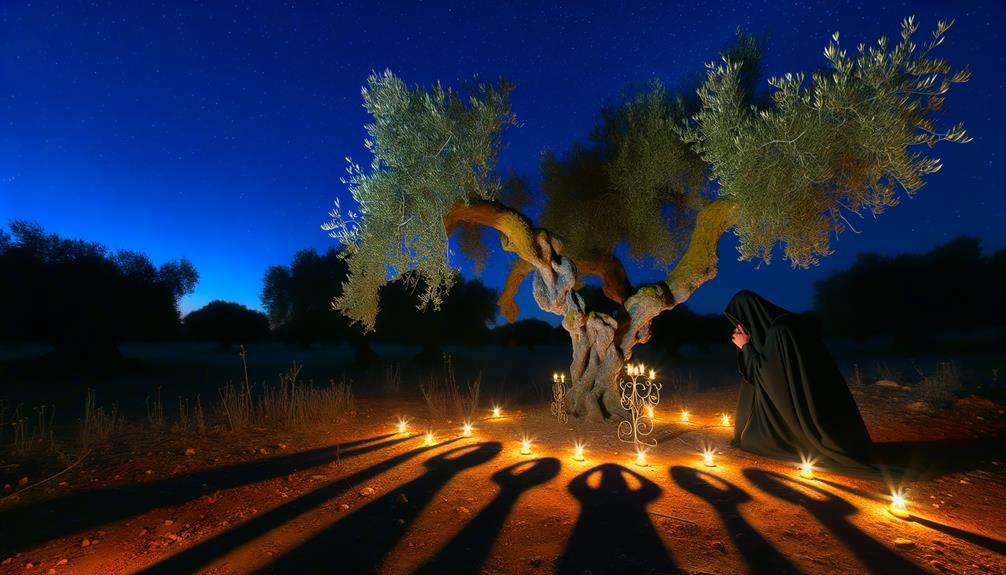
Cultural interpretations of ‘Black Sabbath’ exhibit a rich tapestry of meanings, influenced by varying historical periods, religious beliefs, and artistic expressions. Historically, the term has transcended its biblical roots to evoke diverse and multifaceted images.
- Medieval Europe: Often associated with witchcraft and dark rituals, reflecting societal fears and moral panics.
- Modern Pop Culture: Popularized by the eponymous heavy metal band, symbolizing rebellion and countercultural ethos.
- Literature and Art: Depicted in various artistic mediums as a metaphor for existential dread and moral ambiguity.
- Religious Practices: In some sects, viewed through the lens of eschatology, serving as a cautionary symbol of divine wrath.
These interpretations collectively shape an intricate mosaic, reflecting humanity’s evolving relationship with the concept.
Religious Misconceptions
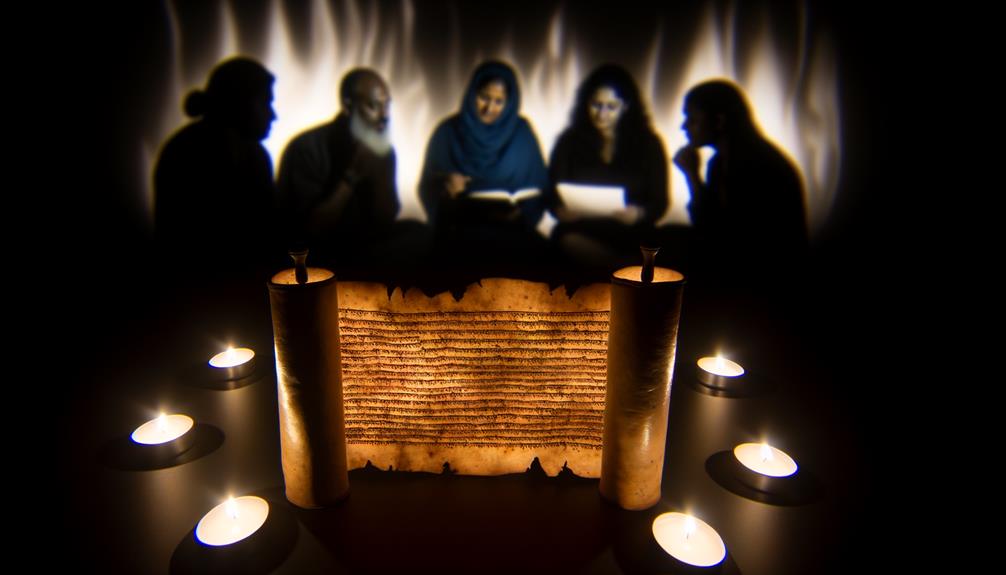
Numerous religious misconceptions surrounding ‘Black Sabbath’ arise from its conflation with various apocryphal and esoteric traditions, leading to a distorted understanding of its original biblical context.
These misconceptions often stem from syncretic interpretations, which combine elements from disparate religious beliefs and mystical practices, thereby obscuring the term’s scriptural roots.
Historically, ‘Black Sabbath’ has been misrepresented in occult literature and popular media, contributing to a narrative riddled with inaccuracies.
This has resulted in an erroneous association with malevolent rituals and dark omens, overshadowing its legitimate religious significance.
A scholarly examination reveals that these interpretations are far removed from canonical texts, necessitating a return to authentic biblical exegesis to dispel prevalent myths and restore theological precision.
Sabbath in Modern Christianity
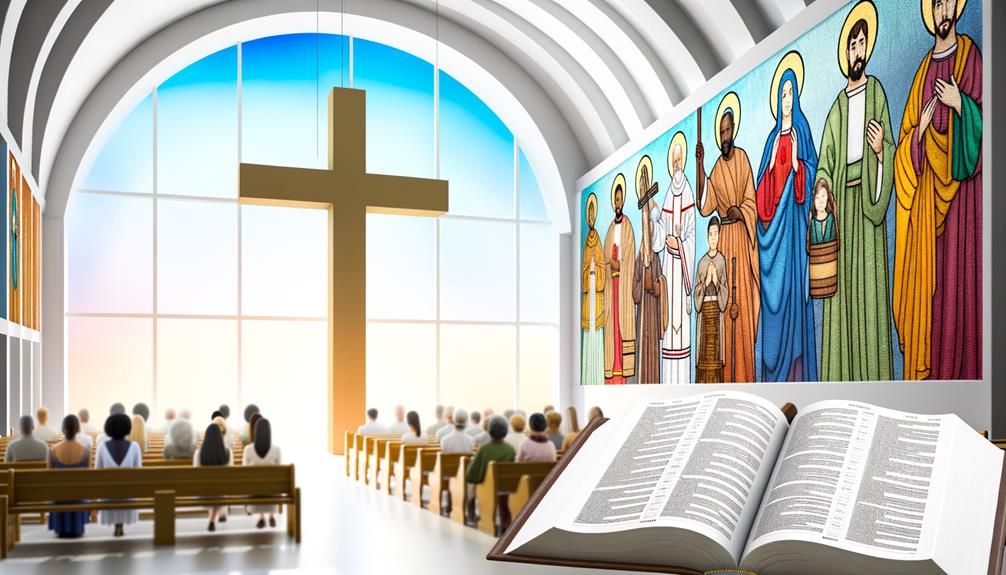
In contemporary Christian practice, the observance of the Sabbath has evolved into a multifaceted tradition, reflecting diverse theological interpretations and denominational customs.
The spectrum of Sabbath observance includes various approaches:
- Liturgical Worship: Many denominations, such as Roman Catholic and Orthodox churches, emphasize structured liturgies and sacraments.
- Rest and Reflection: Protestant communities often stress personal rest and spiritual reflection, viewing the Sabbath as a time for rejuvenation.
- Community Fellowship: Evangelical and Pentecostal groups may focus on communal activities and fellowship, reinforcing social bonds within the congregation.
This diversity illustrates the adaptive nature of Sabbath observance in modern Christianity.
Spiritual Significance

The spiritual significance of the Sabbath extends beyond mere ritualistic observance, encapsulating profound theological themes of rest, renewal, and divine-human relationship.
Rooted in the Genesis creation narrative where God rested on the seventh day, the Sabbath serves as a symbol of divine completion and perfection.
Theologically, it invites believers to partake in God’s sanctified rest, fostering a contemplative space for spiritual rejuvenation and communion with the divine.
In addition, the Sabbath underscores the covenantal bond between God and humanity, acting as a perpetual reminder of God’s providence and grace.
Its observance, consequently, is not merely a cessation of labor but a deliberate engagement in spiritual reflection, aligning human rhythms with divine cadence, and reaffirming faith in God’s sovereignty.
Conclusion
The Sabbath, a day of rest rooted in biblical tradition, weaves through the Old and New Scriptures, embodying both historical significance and spiritual depth. Its observances and interpretations have evolved, reflecting cultural and religious shifts.
Amid these transformations, the Sabbath remains a cornerstone of faith, a beacon guiding the faithful toward reflection and renewal.
Like a timeless tapestry, its intricate patterns of rest and worship continue to enrich modern Christian practice and understanding.






